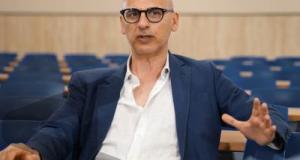
Notizie
Andrea Mammone è un professore associato di storia contemporanea presso l'Università Sapienza di Roma. Ha insegnato storico dell'Europa presso l'Università di Londra. È stato anche visiting scholar presso l'Andrea Mitchell Center for the Study of Democracy, University of Pennsylvania e presso il Robert Schuman Centre for Advanced Studies, European University Institute. Ha inoltre vinto una borsa di studio presso l'Italian Academy, Columbia University. È stato co-direttore della rivista Modern Italy della Cambridge University Press. Ha pubblicato saggi e volumi sui partiti di estrema destra europei del dopoguerra, sul fascismo, sul nazionalismo, sul razzismo e sulla memoria. Il suo Transnational Neofascism in France and Italy è stato pubblicato dalla Cambridge University Press. Ha curato numerosi volumi (Routledge) e riviste sull'estrema destra in Europa e sull'Italia contemporanea. Sta inoltre curando il nuovo Routledge Handbook of Contemporary Italian History. La sua ultima monografia Il mito dei Borbone è uscita nell'estate del 2024 (Mondadori) e ha vinto il Premio Libro dell'Anno dell'Istituto per la storia del Risorgimento italiano e il Premio Anassilaos. Sta inoltre scrivendo una breve monografia sull'estrema destra italiana e sul fascismo dal 1989 per la Cambridge University Press. È stato invitato a tenere conferenze e seminari discorsi presso Georgetown University, University of Maastricht, Istituto Storico Germanico, American Academy in Rome, Università di Padova, University of Amsterdam, Jagiellonian University, Sciences Po Paris, Queen’s University Belfast, Cornell University, New School, Scripps College, UCLA, CUNY Graduate Center, University of Warwick, University of Teesside, University of Bath, Indiana University, University of Pennsylvania e in molte altre istituzioni. Ha scritto per il New York Times, The Guardian, Corriere della Sera, Haaretz, Los Angeles Review of Books, Foreign Affairs, Social Europe, New Statesman, La Stampa, Washington Post, Al Jazeera, CNN, HuffPost e in molti altri giornali e media.
Andrea Mammone is an associate professor of contemporary history at Sapienza University of Rome. He was a historian of Europe at the University of London. He was also a visiting scholar at the Andrea Mitchell Center for the Study of Democracy, University of Pennsylvania and at the Robert Schuman Centre for Advanced Studies, European University Institute. He also won a fellowship at the Italian Academy, Columbia University. He was the co-editor of Cambridge University Press’s journal Modern Italy. He has extensively published on Europe’s post-war European far-right parties, fascism, nationalism, xenofobia, and on memory. His Transnational Neofascism in France and Italy was published by Cambridge University Press. He coedited many volumes (Routledge) and journal editions on both the far right in Europe and contemporary Italy. He is also coediting the new Routledge Handbook of Contemporary Italian History. His latest monograph on the memory and historical revisionism in southern Italy came out in Summer 2024 (Mondadori). He is also writing a short monograph on the Italian far right and fascism since 1989 for Cambridge University Press. He was invited to lecture and speeches at Georgetown University, University of Maastricht, Istituto Storico Germanico, American Academy in Rome, Università di Padova, University of Amsterdam, Jagiellonian University, Sciences Po Paris, Queen’s University Belfast, Cornell University, New School, Scripps College, UCLA, CUNY Graduate Center, University of Warwick, University of Teesside, University of Bath, Indiana University, University of Pennsylvania, along with many other institutions. He has written for New York Times, The Guardian, Corriere della Sera, Haaretz, Los Angeles Review of Books, Foreign Affairs, Social Europe, New Statesman, La Stampa, Washington Post, Al Jazeera, CNN, HuffPost, among others.
Orario ricevimento
Giov. 10-12. contattare il docente via email per organizzare incontro.
ufficio 10 storia moderna e contemporanea.
NB: le sessioni d'esame straordinarie di aprile e di novembre sono aperte a tutti/e.
classroom
studi storico artistici
https://classroom.google.com/c/ODI4NTcwNjA4NDcz?cjc=nbfios7j
fashion
https://classroom.google.com/c/MjE5MTIyMTU5MTha?cjc=s7hlfzoc
storia contemporanea IV E
https://classroom.google.com/c/ODI4NTYyOTIyNDU4?cjc=nv7zcxav
Insegnamenti
| Codice insegnamento | Insegnamento | Anno | Semestre | Lingua | Corso | Codice corso | Curriculum |
|---|---|---|---|---|---|---|---|
| 1026244 | STORIA CONTEMPORANEA IV E | 2º | 2º | ITA | Scienze storiche. Medioevo, età moderna, età contemporanea | 33557 | Storia Medievale e Paleografia (Percorso valido anche ai fini del rilascio del doppio titolo italo-francese) |
| 10606624 | FASHION IN CONTEMPORARY HISTORY | 2º | 2º | ENG | Fashion theory and practices - Teoria e tecniche della moda | 33553 | Curriculum unico |
| 1026244 | STORIA CONTEMPORANEA IV E | 2º | 2º | ITA | Scienze storiche. Medioevo, età moderna, età contemporanea | 33557 | Storia moderna e contemporanea (Percorso valido anche ai fini del rilascio del doppio titolo italo-francese) |
| 1018099 | STORIA CONTEMPORANEA | 2º | 2º | ITA | Studi storico-artistici | 33522 | Curriculum unico |
